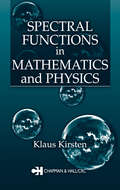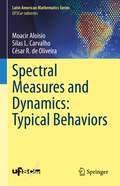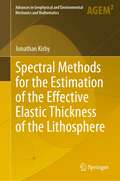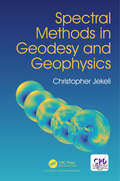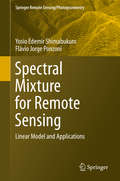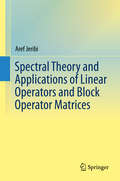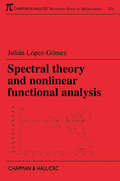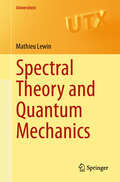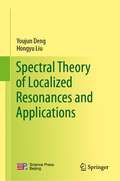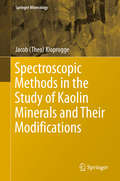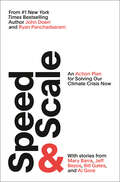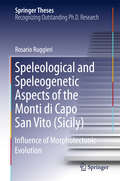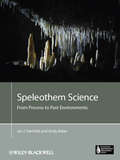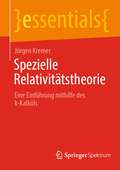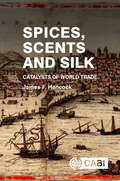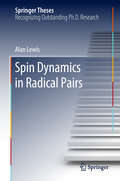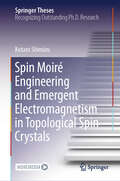- Table View
- List View
Spectral Functions in Mathematics and Physics
by Klaus KirstenThe literature on the spectral analysis of second order elliptic differential operators contains a great deal of information on the spectral functions for explicitly known spectra. The same is not true, however, for situations where the spectra are not explicitly known. Over the last several years, the author and his colleagues have developed new,
Spectral Measures and Dynamics: Typical Behaviors (Latin American Mathematics Series)
by César R. de Oliveira Moacir Aloisio Silas L. CarvalhoThis book convenes and deepens generic results about spectral measures, many of them available so far in scattered literature. It starts with classic topics such as Wiener lemma, Strichartz inequality, and the basics of fractal dimensions of measures, progressing to more advanced material, some of them developed by the own authors.A fundamental concept to the mathematical theory of quantum mechanics, the spectral measure relates to the components of the quantum state concerning the energy levels of the Hamiltonian operator and, on the other hand, to the dynamics of such state. However, these correspondences are not immediate, with many nuances and subtleties discovered in recent years.A valuable example of such subtleties is found in the so-called “Wonderland theorem” first published by B. Simon in 1995. It shows that, for some metric space of self-adjoint operators, the set of operators whose spectral measures are singular continuous is a generic set (which, for some, is exotic). Recent works have revealed that, on top of singular continuity, there are other generic properties of spectral measures. These properties are usually associated with a number of different notions of generalized dimensions, upper and lower dimensions, with dynamical implications in quantum mechanics, ergodicity of dynamical systems, and evolution semigroups. All this opens ways to new and instigating avenues of research.Graduate students with a specific interest in the spectral properties of spectral measure are the primary target audience for this work, while researchers benefit from a selection of important results, many of them presented in the book format for the first time.
Spectral Methods for the Estimation of the Effective Elastic Thickness of the Lithosphere (Advances in Geophysical and Environmental Mechanics and Mathematics)
by Jonathan KirbyAlthough several excellent works exist that describe the effective elastic thickness (Te) of the lithosphere—its theory, significance and relevance to Earth sciences in general—none cover the details of the methods for its estimation. This book brings together the disparate knowledge required to estimate Te in one handy volume: signal processing, harmonic analysis, civil engineering, and foundational mathematics and physics, in addition to the relevant geophysics and, to a lesser extent, geology. Its two principal focus areas are spectral estimation, covering various approaches to estimating the admittance and coherence between gravity and topography using Slepian multitapers and fan wavelets; and algebraic and finite difference solutions of the plate bending partial differential equation in a variety of geological settings. This book would be suitable for postgraduate students beginning their research, up to faculty professors interested in diversifying their skills.
Spectral Methods in Geodesy and Geophysics
by Christopher JekeliThe text develops the principal aspects of applied Fourier analysis and methodology with the main goal to inculcate a different way of perceiving global and regional geodetic and geophysical data, namely from the perspective of the frequency, or spectral, domain rather than the spatial domain. The word "methods" in the title is meant to convey that the transformation of a geophysical signal into the spectral domain can be applied for purposes of analysis as well as rapid computation. The text is written for graduate students; however, Chapters 1 through 4 and parts of 5 can also benefit undergraduates who have a solid and fluent knowledge of integral and differential calculus, have some statistical background, and are not uncomfortable with complex numbers. Concepts are developed by starting from the one-dimensional domain and working up to the spherical domain, which is part of every chapter. Many concepts are illustrated graphically with actual geophysical data primarily from signals of gravity, magnetism, and topography.
Spectral Mixture for Remote Sensing: Linear Model and Applications (Springer Remote Sensing/Photogrammetry)
by Yosio Edemir Shimabukuro Flávio Jorge PonzoniThis book explains in a didactic way the basic concepts of spectral mixing, digital numbers and orbital sensors, and then presents the linear modelling technique of spectral mixing and the generation of fractional images. In addition to presenting a theoretical basis for spectral mixing, the book provides examples of practical applications such as projects for estimating and monitoring deforested areas in the Amazon. In its seven chapters, the book offers remote sensing techniques to understand the main concepts, methods, and limitations of spectral mixing for digital image processing. Chapter 1 addresses the basic concepts of spectral mixing, while chapters 2 and 3 discuss digital numbers and orbital sensors such as MODIS and Landsat MSS. Chapter 4 details the linear spectral mixing model, and chapter 5 talks about how to use this technique to create fraction images. Chapter 6 offers remote sensing applications of fraction images in deforestation monitoring, burned-area mapping, selective logging detection, and land-use/land-cover mapping. Chapter 7 gives some concluding thoughts on spectral mixing, and considers future uses in environmental remote sensing. This book will be of interest to students, teachers, and researchers using remote sensing for Earth observation and environmental modelling.
Spectral Theory and Applications of Linear Operators and Block Operator Matrices
by Aref JeribiExamining recent mathematical developments in the study of Fredholm operators, spectral theory and block operator matrices, with a rigorous treatment of classical Riesz theory of polynomially-compact operators, this volume covers both abstract and applied developments in the study of spectral theory. These topics are intimately related to the stability of underlying physical systems and play a crucial role in many branches of mathematics as well as numerous interdisciplinary applications. By studying classical Riesz theory of polynomially compact operators in order to establish the existence results of the second kind operator equations, this volume will assist the reader working to describe the spectrum, multiplicities and localization of the eigenvalues of polynomially-compact operators.
Spectral Theory and Nonlinear Functional Analysis (Chapman & Hall/CRC Research Notes in Mathematics Series)
by Julian Lopez-GomezThis Research Note addresses several pivotal problems in spectral theory and nonlinear functional analysis in connection with the analysis of the structure set of zeroes of a general class of nonlinear operators. Appealing to a broad audience, it contains many important contributions to linear algebra, linear functional analysis, nonlinear functional analysis, and topology. The author gives several applications of the abstract theory to reaction diffusion equations and systems. The results presented cover a thirty-year period and cut across a variety of mathematical fields.
Spectral Theory and Quantum Mechanics
by Valter MorettiThis book pursues the accurate study of the mathematical foundations of Quantum Theories. It may be considered an introductory text on linear functional analysis with a focus on Hilbert spaces. Specific attention is given to spectral theory features that are relevant in physics. Having left the physical phenomenology in the background, it is the formal and logical aspects of the theory that are privileged. Another not lesser purpose is to collect in one place a number of useful rigorous statements on the mathematical structure of Quantum Mechanics, including some elementary, yet fundamental, results on the Algebraic Formulation of Quantum Theories. In the attempt to reach out to Master's or PhD students, both in physics and mathematics, the material is designed to be self-contained: it includes a summary of point-set topology and abstract measure theory, together with an appendix on differential geometry. The book should benefit established researchers to organise and present the profusion of advanced material disseminated in the literature. Most chapters are accompanied by exercises, many of which are solved explicitly.
Spectral Theory and Quantum Mechanics (Universitext)
by Mathieu LewinThis textbook presents the spectral theory of self-adjoint operators on Hilbert space and its applications in quantum mechanics. Based on a course taught by the author in Paris, the book not only covers the mathematical theory but also provides its physical interpretation, offering an accessible introduction to quantum mechanics for students with a background in mathematics. The presentation incorporates numerous physical examples to illustrate the abstract theory. The final two chapters present recent findings on Schrödinger’s equation for systems of particles. While primarily designed for graduate courses, the book can also serve as a valuable introduction to the subject for more advanced readers. It requires no prior knowledge of physics, assuming only a graduate-level understanding of mathematical analysis from the reader.
Spectral Theory of Localized Resonances and Applications
by Hongyu Liu Youjun DengThis book is devoted to the spectral theory of localized resonances including surface plasmon/polariton resonances, atypical resonances, anomalous localized resonances and interior transmission resonances. Those resonance phenomena arise in different physical contexts, but share similar features. They form the fundamental basis for many cutting-edge technologies and applications including invisibility cloaking and super-resolution imaging. The book presents a systematic and comprehensive treatment on these resonance phenomena and the associated applications in a unified manner from a mathematical and spectral perspective, covering acoustic, electromagnetic and elastic wave scattering.The book can serve as a handy reference book for researchers in this field and it can also serve as a textbook or an inspiring source for postgraduate students who are interested in entering this field.
Spectroscopic Methods in the Study of Kaolin Minerals and Their Modifications (Springer Mineralogy Ser.)
by Jacob Theo KloproggeThis book systematically provides an overview of the use of a wide range of spectroscopic methods (Mid- and Near-Infrared, Infrared Emission, Raman, Solid-State Magic Angle Spinning Nuclear Magnetic Resonance, X-ray Photoelectron, Extended X-ray Absorption Fine Structure, X-ray Absorption Near Edge, Electron Spin and Mössbauer spectroscopy) to investigate kaolin minerals (kaolinite, dickite, nacrite and halloysite) and their modifications (intercalation compounds, nanocomposites and other modifications).
Speed & Scale: An Action Plan for Solving Our Climate Crisis Now
by John Doerr#1 bestselling author and acclaimed venture capitalist John Doerr reveals a sweeping action plan to conquer humanity&’s greatest challenge: climate change.In 2006, John Doerr was moved by Al Gore&’s An Inconvenient Truth and a challenge from his teenage daughter: &“Dad, your generation created this problem. You better fix it.&” Since then, Doerr has searched for solutions to this existential problem—as an investor, an advocate, and a philanthropist. Fifteen years later, despite breakthroughs in batteries, electric vehicles, plant-based proteins, and solar and wind power, global warming continues to get worse. Its impact is all around us: droughts, floods, wildfires, the melting of the polar ice caps. Our world is squarely in a climate crisis and on the brink of a climate disaster. Yet despite our state of emergency, climate change has yet to be tackled with the urgency and ambition it demands. More than ever, we need a clear course of action. What if the goal-setting techniques that powered the rise of today's most innovative organizations were brought to bear on humanity's greatest challenge? Fueled by a powerful tool called Objectives and Key Results (OKRs), SPEED & SCALE offers an unprecedented global plan to cut greenhouse gas emissions before it&’s too late. Used by Google, Bono&’s ONE foundation, and thousands of startups the world over, OKRs have scaled ideas into achievements that changed the world. With clear-eyed realism and an engineer&’s precision, Doerr identifies the measurable OKRs we need to reduce emissions across the board and to arrive by 2050 at net zero—the point where we are no longer adding to the heat-trapping carbon in the atmosphere. By turns pragmatic and inspiring, SPEED & SCALE intersperses Doerr&’s wide-ranging analysis with firsthand accounts from Jeff Bezos, Christiana Figueres, Al Gore, Mary Barra, Bill Gates, and other intrepid policy leaders, entrepreneurs, scientists, and activists. A launchpad for those who are ready to act now, this book is geared to leaders in every walk of life. With a definitive action plan, the latest science, and a rising climate movement on our side, we can still reach net zero before it is too late. But as Doerr reminds us, there is no more time to waste.
Speleological and Speleogenetic Aspects of the Monti di Capo San Vito (Sicily)
by Rosario RuggieriThis thesis includes a wealth of cave maps, as well as photos of the caves and karst morphologies. At the heart of the thesis is the important discovery of a flank margin cave with speleothem hiatuses and fossil invertebrate associations. The analysis of the structural and karst morphological elements surveyed in the main explored caves in Monti di Capo San Vito has made it possible to identify both the state of control of the processes of karstification in tectonic phases during the Plio-Pleistocene upliftings and the kinematic character of some karstified structures, linked at two speleogenetic phases. Furthermore, the surveying of karst forms on the relict sea-cliffs and particularly the exceptional discovery and dating of marine and continental incrustations in the Rumena cave, has yielded essential advances in our knowledge of past climatic events and eustatic level changes in the Mediterranean, as well as their influence on the evolution of the coastal belt.
Speleology of Montenegro (Cave and Karst Systems of the World)
by Goran BarovicThis book represents a comprehensive overview of the caves and karsts of Montenegro, a small territory yet one of the fascinating areas regarding speleology. In Montenegro, there are more than 1500 karst wonders identified. Đalovića cave, with more than 20 km, ranks as the longest in the region. In the Maganika massif, Iron Cave also ranks first but because of its length reaching 1100 m. Montenegro's history is also connected to caves as two very popular and visited sanctuaries, monasteries built in the cave - Ostrog and Dajbabe. In another speleo-archaeological site, cave Red Rock, 32 layers with a measured age of 180,000 years, is highly relevant in Europe.
Speleothem Science
by Andy Baker Ian J. FairchildSpeleothems (mineral deposits that formed in caves) are currently giving us some of the most exciting insights into environments and climates during the Pleistocene ice ages and the subsequent Holocene rise of civilizations. The book applies system science to Quaternary environments in a new and rigorous way and gives holistic explanations the relations between the properties of speleothems and the climatic and cave setting in which they are found. It is designed as the ideal companion to someone embarking on speleothem research and, since the underlying science is very broad, it will also be invaluable to a wide variety of others. Students and professional scientists interested in carbonate rocks, karst hydrogeology, climatology, aqueous geochemistry, carbonate geochemistry and the calibration of climatic proxies will find up-to-date reviews of these topics here. The book will also be valuable to Quaternary scientists who, up to now, have lacked a thorough overview of these important archives.Additional resources for this book can be found at: www.wiley.com/go/fairchild/speleothem.
Spezielle Funktionen der Physik mit MATLAB
by Wolfgang SchweizerDieses Lehrbuch konzentriert sich auf spezielle Funktionen der Physik im reellen und komplexen Bereich. Es behandelt mehr als 170 verschiedene Funktionen mit zusätzlichen numerischen Hinweisen für effiziente Berechnungen, die für jeden nützlich sind, der auch mit anderen Programmiersprachen programmieren muss. Das Buch enthält MATLAB-basierte Programme für jede dieser Funktionen und eine ausführliche html-basierte Dokumentation. Einige der erklärten Funktionen sind: Gamma- und Beta-Funktionen; Legendre-Funktionen, die mit der Quantenmechanik und der Elektrodynamik in Verbindung stehen; Bessel-Funktionen; hypergeometrische Funktionen, die in der mathematischen Physik eine wichtige Rolle spielen; orthogonale Polynome, die vor allem in der computergestützten Physik verwendet werden; und Riemann-Zeta-Funktionen, die z. B. in der Quantenchaos- oder Stringtheorie eine wichtige Rolle spielen. Das Buch richtet sich in erster Linie an Wissenschaftler, Fachleute in Forschungsbereichen der Industrie und fortgeschrittene Studierende der Physik, der angewandten Mathematik und der Ingenieurwissenschaften.
Spezielle Relativitätstheorie: Eine Einführung mithilfe des k-Kalküls (essentials)
by Jürgen KremerDas Buch bietet eine Einführung in die Spezielle Relativitätstheorie mithilfe des k- Kalküls. Dieser Zugang ist sehr elegant und verwendet die auf der Radarmethode basierende geometrische Darstellung der zweidimensionalen Raumzeit aus der Perspektive inertialer Beobachter. Die letzten Kapitel des Buchs behandeln die vierdimensionalen Lorentz-Transformationen und die Äquivalenz von Masse und Energie. Das Buch endet mit einer Darstellung des Zusammenhangs zwischen der Signalübertragung mit Überlichtgeschwindigkeit und der Verletzung des Kausalitätsprinzips.
Spezielle und allgemeine Relativitätstheorie für Bachelorstudenten
by Reinhard MeinelDieses Lehrbuch bietet bereits im Bachelorstudium einen gut verständlichen Zugang nicht nur zur speziellen, sondern auch zur allgemeinen Relativitätstheorie. Besonderheiten: Erstmals in einem Lehrbuch wird eine physikalische Herleitung der berühmten Kerr-Newman-Lösung gegeben. Dank der zahlreichen Übungsaufgaben mit ausführlich dargestellten Lösungen ist das Buch auch zum Selbststudium geeignet. Inhalt: Einführung – Der Minkowski-Raum, die Raumzeit der SRT – Lorentz-Transformationen – Vierervektoren und Vierertensoren – Relativistische Punktmechanik – Andere Teilgebiete der Physik im Rahmen der SRT – Grundideen der ART – Geometrie der Raumzeit – Physik in der gekrümmten Raumzeit – Die Einstein'schen Feldgleichungen – Der Newton'sche Grenzfall – Die Schwarzschild-Lösung – Die klassischen Effekte der ART – Kugelsymmetrische Sternmodelle – Die Schwarzschild-Lösung als Schwarzes Loch – Das Wirkungsprinzip der ART – Ausblick auf Gravitationswellen, Kosmologie und Quantengravitation – Mathematische Methoden – Rotierende und elektrisch geladene Schwarze Löcher – Die rotierende Staubscheibe Neuerungen (3. Aufl.): Neben neuen Aufgaben und Lösungen wurde auch ein Abschnitt zur Thermodynamik Schwarzer Löcher hinzugefügt. Zielgruppe: Studierende und Lehrende der Physik, sowohl im Hauptstudium als auch im Lehramtsstudium Vorkenntnisse: Vorausgesetzt werden lediglich Grundkenntnisse der klassischen Mechanik und der Elektrodynamik sowie der zugehörigen mathematischen Hilfsmittel.
Spezielle und allgemeine Relativitätstheorie: Grundlagen, Anwendungen in Astrophysik und Kosmologie sowie relativistische Visualisierung
by Thomas Müller Sebastian Boblest Günter WunnerDieses Lehrbuch verknüpft die mathematischen Grundlagen der speziellen und allgemeinen Relativitätstheorie mit zahlreichen Anwendungsgebieten aus Physik und Astronomie. Neben der Diskussion von klassischen Experimenten, welche die Vorhersagen der Relativitätstheorie bestätigen, wird ein Fokus auf die Kosmologie als Anwendung der Relativitätstheorie gesetzt. Die Behandlung der Physik kompakter stellarer Objekte, d. h. von weißen Zwergen, Neutronensternen und Schwarzen Löchern, mit einem kurzen Abschnitt zur Entstehung und Entwicklung von Sternen runden die Darstellung ab.Einen besonderen Schwerpunkt legen die Autoren auf die relativistische Visualisierung. In zwei Kapiteln bekommt der Leser einen Überblick über verschiedene Techniken in der speziellen und allgemeinen Relativitätstheorie. Anhand von Beispielen können die der Alltagserfahrung scheinbar widersprechenden Vorhersagen der Relativitätstheorie besser fassbar gemacht werden. Die daraus gewonnenen Abbildungen und begleitenden Videos, die über die SN More Media App zugänglich sind, erweitern das Verständnis der im Text behandelten Themen.In der vorliegenden zweiten Auflage haben die Autoren vor allem neuere Entwicklungen (z.B. zum Thema Gravitationswellen) aufgenommen und zudem viele kleinere Verbesserungen und Ergänzungen vorgenommen. Das Buch richtet sich besonders an Studierende der Physik und verwandter Studiengänge, die sich einen Überblick über die Relativitätstheorie und ihre Anwendungsgebiete verschaffen möchten, aber auch interessierte Laien können damit interessante Einsichten gewinnen.
Spices, Scents and Silk: Catalysts of World Trade
by James HancockSpices, scents and silks were at the centre of world trade for millennia. Exotic luxuries such as cinnamon, ginger, pepper, saffron, clove, frankincense and myrrh. Through their international trade, humans were pushed to explore and then travel to the far corners of the earth. Almost from their inception, the earliest great civilizations - Egypt, Sumer and Harappa - became addicted to the luxury products of far-off lands and established long-reaching trade networks. Over time, great powers fought mightily for the kingdoms where silk, spices and scents were produced. The New World was accidentally discovered by Columbus in his quest for spices. What made trade in these products so remarkable was that the plants producing them grew in very restricted areas of the world, distant from the wealthy civilizations of northern Africa, Greece and Europe. These luxuries could be carried from mysterious locations on the backs of camels or in the holds of ships for months on end, and arrived at their final destination in nearly perfect condition. Once the western world discovered the intoxicating properties of these products, their procurement became a dominant force in the world economy. Nothing else compared with their possible profit returns. In this book, eminent horticulturist and author James Hancock examines the origins and early domestication and culture of spices, scents and silks and the central role they played in the lives of the ancients. The book also traces the development of the great international trade networks and explores how struggles for trade dominance and demand for such luxuries shaped the world. Recommended for academics, students and general readers with an interest in crop and agricultural development, world trade, economic botany, history of food, and global economics and public policy, Spices, Scents and Silk offers a fascinating and insightful history.
Spin Dynamics and Damping in Ferromagnetic Thin Films and Nanostructures
by Anjan Barman Jaivardhan SinhaThis book provides a comprehensive overview of the latest developments in the field of spin dynamics and magnetic damping. It discusses the various ways to tune damping, specifically, dynamic and static control in a ferromagnetic layer/heavy metal layer. In addition, it addresses all optical detection techniques for the investigation of modulation of damping, for example, the time-resolved magneto-optical Kerr effect technique.
Spin Dynamics in Radical Pairs (Springer Theses)
by Alan LewisThis book sheds new light on the dynamical behaviour of electron spins in molecules containing two unpaired electrons (i.e. a radical pair). The quantum dynamics of these spins are made complicated by the interaction between the electrons and the many nuclear spins of the molecule; they are intractable using analytical techniques, and a naïve numerical diagonalization is not remotely possible using current computational resources. Hence, this book presents a new method for obtaining the exact quantum-mechanical dynamics of radical pairs with a modest number of nuclear spins. Readers will learn how a calculation that would take 13 years using conventional wavepacket propagation can now be done in 1 day, and will also discover a new semiclassical method for approximating the dynamics in the presence of many nuclear spins. The new methods covered in this book are shown to provide significant insights into three topical and diverse areas: charge recombination in molecular wires (which can be used in artificially mimicking photosynthesis), magnetoelectroluminescence in organic light-emitting diodes, and avian magnetoreception (how birds sense the Earth’s magnetic field in order to navigate).
Spin Dynamics in Two-Dimensional Quantum Materials: A Theoretical Study (Springer Theses)
by Marc Vila TusellThis thesis focuses on the exploration of nontrivial spin dynamics in graphene-based devices and topological materials, using realistic theoretical models and state-of-the-art quantum transport methodologies. The main outcomes of this work are: (i) the analysis of the crossover from diffusive to ballistic spin transport regimes in ultraclean graphene nonlocal devices, and (ii) investigation of spin transport and spin dynamics phenomena (such as the (quantum) spin Hall effect) in novel topological materials, such as monolayer Weyl semimetals WeTe2 and MoTe2. Indeed, the ballistic spin transport results are key for further interpretation of ultraclean spintronic devices, and will enable extracting precise values of spin diffusion lengths in diffusive transport and guide experiments in the (quasi)ballistic regime. Furthermore, the thesis provides an in-depth theoretical interpretation of puzzling huge measured efficiencies of the spin Hall effect in MoTe2, as well as a prediction of a novel canted quantum spin Hall effect in WTe2 with spins pointing in the yz plane.
Spin Ice (Springer Series in Solid-State Sciences #197)
by Masafumi Udagawa Ludovic JaubertThis book deals with a new class of magnetic materials, spin ice. Spin ice has become the canonical example of modern frustrated magnetism where competing interactions between spins set the rules for an emergent magnetostatic gauge field theory. Excitations take the form of magnetic monopoles or can condense via a Higgs mechanism. Beyond classical spin ice, the book describes the new physics emerging when quantum coherence (spin liquids, photon-like excitations) and itinerant electrons (anomalous Hall effect) are included in artificial systems. This first book dedicated to spin ice is a review of the current understanding of the field, both on the theoretical and experimental levels, written by leading experts. The book is written in a linear way with very few prerequisites. It also contains textbook-like descriptions of theoretical methods to help advanced students and researchers to enter the field.
Spin Moiré Engineering and Emergent Electromagnetism in Topological Spin Crystals (Springer Theses)
by Kotaro ShimizuThis book provides a comprehensive theoretical investigation into the engineering of topological properties, emergent electromagnetic phenomena, and magnetic and electrical functionalities of materials associated with topological spin textures. Topological spin textures in bulk magnets such as skyrmions form their periodic arrangements called topological spin crystals. They exhibit unique magnetic properties and quantum transport phenomena due to their noncollinear and noncoplanar spin textures. One of the challenging problems in these magnets is flexible generation, annihilation, and control of the spin textures with different topology, leading to their novel functionality useful for next-generation devices. Although such a problem has been discussed in several specific cases, a generic viewpoint was missing in the previous works. To facilitate the systematic discussion on the control of the topological spin textures, the author proposes the &“spin moiré&” picture, taking particular note of the observation that topological spin crystals are often represented as superpositions of multiple spin density waves. Moiré is an interference fringe generated by a superposition of waves and it exhibits the periodicity different from the superposed waves. Importantly, a variety of moiré patterns are realized in many ways by changing a number of parameters, e.g., periods, amplitudes, phases, propagating directions, and the number of superposed waves. Given the analogy with the conventional moiré patterns, one can conceive a further variety of spin patterns and their continuous modulations by regarding the topological spin crystals as moiré patterns of the vector (spinor) fields. Given the growing recognition of topology's significance in describing the state of matter, especially in magnetic materials, the findings presented in this book establish a versatile framework for controlling topological magnetism, which does not only advance the fundamental understanding of topological properties in magnets but also opens new pathways for exploring emergent electromagnetic phenomena and designing magnetic functionalities. Intended for students and researchers in the fields of condensed matter physics and material science, this book serves as a valuable resource for those interested in fundamental theory and advanced discussions of topological magnetism and its control.
